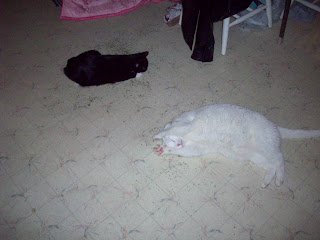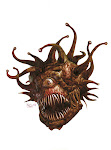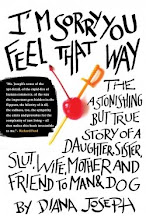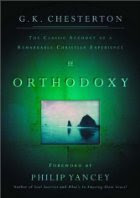2009/03/30
Comps, part II: Poetry
The Complete Book of Kong by William Trowbridge
and either
The Dig by Lynn Emanuel
or
The Resurrection Machine by Steve Gehrke
I have little doubt as to the question:
2: Image and Metaphor
The Latest Obsession
2009/03/27
For Whom the Comp Tolls, It Tolls for Thee
"Congress" [from Honored Guest] by Joy Williams
"Charity" [from Honored Guest] by Joy Williams
"The Visiting Privilege" [from Honored Guest] by Joy Williams
"Traveling to Pridesup" [from Taking Care] by Joy Williams
"Winter Chemistry" [from Taking Care] by Joy Williams
"Feast of the Earth, Ransom of the Clay" [from The Ice at the Bottom of the World] by Mark Richard
"What You Left in the Ditch" [from The Girl in the Flammable Skirt] by Aimee Bender
"Quiet Please" [from The Girl in the Flammable Skirt] by Aimee Bender
"The Little Puppy That Could" [from Einstein’s Monsters] by Martin Amis
"The Deal" [from Going Places] by Leonard Michaels
"Scarliotti and the Sinkhole" [from Aliens of Affection] by Padgett Powell
As you can see I am fond of Joy Williams's stories.
And I have narrowed down which questions I will consider:
1: Point of View
2: Characterization
7: Imagery
Decisions.
2009/03/23
The Wonderful World of Verbs
2009/03/22
Not ick; more of a Why-would-you-want-to?
Oh ick, ick, ick
2009/03/18
Distraction, Heart . . . Writings from Nine Months Ago
I should pay attention to Distraction, not to distractions, in whatever form they manifest, but to Distraction itself.
*
How can one distract one's distraction?
*
Distraction. Loss. A sense of outrage. An inability to think rationally and clearly. A grasping at quick fixes that do not fix, and are not quick. A demand for immediate satisfaction of desires, of wants, of success. (Does desire know only gift and theft?) The chasing of happiness, when happiness itself is unknown and undefinable. What the hell is it? "Happy" cannot exist as a verb. It needs a helper: to make, to be, to become. Or it needs an active verb: to pursue, to chase, to grab, to forget, etc.
*
What about thumbtacks? The empty aquarium? The lava lamp that’s missing its base? What things have Heart? Does a bead have Heart? A bead has Heart. A bead’s heart is its hole, through which a twine strings together one bead with other beads, a string of Heart. A bead without its hole is not a bead, but a marble, a pebble, a bit of glass, something else. But not a bead.
---
Absence is Heart. A treasure ceases to be treasure once it is no longer valued. An empty aquarium, aquarium though it may be, contains absence, it contains something that is not there. A shoe without a foot. A ring without a finger. A day without pain.
---
Does a gun have a Heart? Does a bullet count? Does a will, a want, a desire? Is there Heart in an action: picking up a gun in a moment of passion? Throwing down a gun before a fight has begun? Agreement to the use of force by action of the force itself. Disagreement to the use of force by action of dropping the gun. Is there Heart in fear? Fear that is felt by bystanders, preservation, an impulse not toward action but toward words, paralysis. Prayer? Is prayer action or words or both?
---
In Heart lies desire. What truth is in the statement "Desire knows only theft and gift"? What does Heart know? Does Heart know theft? Gift? Absence? Does the hole through a bead desire twine?
---
"So What?" and "Defamiliarization" share something in common. What is it? A new perspective of an old thing. A different understanding of something thoroughly understood. A sensory experience of something that offers no sensory stimulation.
---
What am I seeking? The language of excess. The language of distraction. The language of stories, and myths, and narratives. The language to move readers. The language to argue, to convey, to understand, to escape. The language of characterization.
---
Listen to the background noise, the hiss and chime behind vertical surfaces. What do you hear? How do you hear it?
2009/03/11
Spine & Heart (Process VIII)
Onward.
Have any of us read Orthodoxy by G.K. Chesterton? I am reading this book again (third or fourth time) because I feel my writing has stagnated. Oh I’m producing. I’m writing habitually. But something is stuck. Something in the writing isn’t moving. There is no reason to go out of my way (and out of my wits) to identify what that something is. These somethings happen to us all.
Anyhow. I won’t explain Orthodoxy or summarize it. (To do so would cheapen the experience of reading it for the first time.) Though I will leap into worthwhile passages that have helped me to understand more deeply the Process.
In "The Ethics of Elfland" Chesterton explains the difference between the Reasonable, Necessary logic of actions in actuality and the possibility of the same Reasonable, Necessary logic of actions in fairyland. He is explaining the relationship of what I call "Heart and Spine."
Spine: the structure of literal sense that is necessary for a reader to be able to read the story (analogous to Mathematics, or the Letter of the Law). Without Spine, the story cannot move; it is paralyzed. The narrative has no mobility, no legs to walk on, no arms to wave, no fingers with which to gesture. Without Spine, the processes necessary for a narrative body to do anything cannot happen.
Heart: the figurative and emotional sense that is necessary for a reader to be able to relate to the story (analogous to the Spirit of the Law). Without Heart, the story may as well be a technical schematic, a complex algebraic equation, a health insurance policy. Without Heart, the story lacks emotion as well as the means of carrying the weight of emotion through language.
"The test of fairyland [is] the test of the imagination" (69). For example: "The witch in a fairy tale says, ‘Blow the horn, and the ogre’s castle will fall’; but she does not say it as if it were something in which the effect obviously arose out of the cause. Doubtless she has given the advice to many champions, and has seen many castles fall, but she does not lose either her wonder or her reason. She does not muddle her head until it imagines a necessary mental connection between a horn and a falling tower."
In narrative, Heart embodies mystery. Spine does not. But Spine is necessary in order to understand the story at all. With paralysis the Heart may or may not go on beating; regardless, it is lost to us. When we read the story of a witch who tells a champion, "Blow a horn, and the ogre’s castle will fall", if we immediately stop to question the witch ("Why must the champion blow a horn? That doesn’t make sense. What he needs to do is raise an army, or find some way to trick the bastard, or hire someone else to do the dirty work...etc.), then we destroy the mystery. We rip the Heart out of the story and squeeze the life out of it. The witch’s advice is part of the mystery. The witch herself is part of the mystery. No one can explain it definitively. There is no denotation. You can define what mystery itself is, but you cannot explain any given mystery. That is the Heart of a story. The Thing-in-Itself cannot be explained. And of course, if we rip out the Heart, the Spine becomes a mere spine, a structure without purpose. A structure for the sake of itself. Of what use is such a thing?
2009/03/08
2009/03/05
Something To Do
Goddamn Jackrabbits
What do these stories have in common (aside from how much I love them)?
Except for Strays, there is a scene in each story, in which two characters are riding together in a car and either witness or cause the death of a rabbit. (In Strays, there is "an exploded chicken in the grill of Uncle Trash’s car." Similar, yet so very different.)
How does the same fundamental scene appear in three different stories? In Taking Care, Jones is driving along with his granddaughter strapped into her carseat next to him. He sees a hare running through the snow. The next thing that happens, a hunter shoots the hare, which tumbles to a dead flop in the road. In Phoenix, Arizona, Thomas Builds-the-Fire takes over driving from Victor in the middle of the Nevada desert. Immediately, a long-eared jackrabbit dashes out in front of the pickup, and Thomas runs over it. The rabbit is "first living thing" they see in all of Nevada, and Thomas kills it. They are quick to tell each other that the jackrabbit’s death must have been suicide. In Emergency, Georgie the Orderly is driving along with the narrator, Fuckhead, sitting beside him. Georgie hit a rabbit. They didn’t notice right away. Georgie stopped, then "threw the truck in reverse" and "zigzagged back to rabbit, almost running over the poor animal a second time." We all know what Georgie did to the rabbit next.
So, what’s with the common scene? Why does it repeat itself in three different stories? Taking Care was published first, in the 1970s. Emergency second, though much later, in 1992. This Is What it Means to Say Phoenix, Arizona third, in 1993. This is a baffling sort of mystery, the running over of rabbits with vehicles in contemporary fiction. I have no explanation for this phenomenon. But I am curious to find other examples of the same scene.
2009/03/04
Gooooo . . . ooooogle
VERBS
There are two stories in particular (neither of which are mine) that make especial use of verbs: Steve Almond’s My Life in Heavy Metal (sensory verbs) and Leonard Michaels’ The Deal (action verbs). I’ll start with Mr. Almond.
wag (pp. 1): to walk suggestively; said of the narrator’s fiancé
punch (2): the effect of a powerful odor; in this case, lard used in Mexican cooking
glow (2): said of lighted swimming pools; "glowed like sapphires"
bang out (3): to type against a deadline
blossom (4): said of the effect when the Mexican lifeguard switches from English to her native tongue, Spanish
dance (4): said of the tongue moving against teeth (linked to the example of ‘blossom’)
vault (7): the motion of a woman’s pelvis moving suddenly upward at orgasm
beard (23): wrapped, or enveloped, in an odor; "bearded in the smell of Claudia"
More examples lie scattered throughout the story, but I find these in particular impressive. Almond’s use of verbs in this manner gets me thinking about how I use verbs. How might I describe, say, the feel and taste of capsaicin on a character’s tongue? Rather than saying something like "The hot pepper set his tongue on fire" or "...burned his tongue" or "tingled intolerably" (geez, that last one), I would try to find a sensory verb that does the job in an unexpected-yet-fitting way....Of course nothing comes to mind immediately. It’s hard to do. I’ll figure it out.
Now on to Mr. Michaels (I didn’t keep track of page numbers):
Jammed. Poked. Tucked. Cut. Rode. Slipped. Cracked. Plucked. Looped. Tipped. Nudged. Tilted. Swelled. Yowled. Swivelled. Snapped. Hooked. Cackled. Swept. Steeped. Trotted. Sprayed. Banged.
The verbs in this story wield hard edges. Hard edges and small motions, almost twitch-like in their animation. Which works, because the antagonist(s) is "a raggedy monster of boys", twenty boys total, "jammed together on the stoop." Yowled? That’s the verb used to describe a truck’s gears shifting. Steeped? "The sun was low above the river and the street three quarters steeped in shade." Lovely. After being drenched in summer sun all day, the street is almost relieved to be soaked in shade, itself like water. The angle of light is steeper than the angle of the street, and the shade is now thick, as if one could walk up the incline. Beautiful!
If we haven’t read The Deal, ask me for a copy and I will supply one. (Mr. Camel Cricket has read it. He knows what I’m talking about.)
2009/03/02
Process...VII?
*
What sort of character would concoct homemade napalm for use in booby traps?
*
Have you ever lived near an oxbow lake? An engine bloc depository? A rake forest? A place you could swim naked without fear of being seen?
*
Flute music will come through the wall from the neighbor's apartment. Someone above will be running a blender. You will be chopping a pineapple on the counter with too small a knife. You will not realize your sweater is backward. Later, your date will wonder where all these fleas came from, and you will hope the fleas have gone unnoticed.
*
[A writing challenge: "One character has an unexpected scar."]
*
If you take offense to Kong in Trowbridge's Complete Book of Kong, you're probably the kind of person Kong would squeeze too hard.
*
-spect-
spectate - respect - introspection - inspect -
spectral - specter - disrespect -
circumspect - [prespect] - underinspect -
overinspect - overcircumspection - subspect
*
It isn't that difficult. Do you understand it? Yes or No? Then, Why? and How? (yes or no . . .)
Small, local context? or Universal context?
-Does it matter?
-Don't do this, Don't do that, Avoid all advice good and bad.
Unless the advice works, or doesn't work.
*
Looking forward to going to bed.
*
I am fond of the word "malingerer". Self-abuse. Smacking.
*
"What's the limit on skulls this year?"
"Scram, you assholes."
"Blunt yourselves."
"PILED FOR QUALITY!"
"They hosted parasites."
"Do pugs bay?"
"The mayor's noose-"
"What about the mayor's noose?"
"Paw, as in 'grope.'"
*
Wooden Eyes.
*
2009/03/01
A Selection: 20 minutes of Elocution, by my Daughter
*
[Recorded by hand on the evening of 28 February, 2009. Medium: Crayola markers on yellow college-rule legal pad.]
*
You can't make this stuff up.
A Slowly Growing List of Things to Look Forward To When You Have a Child
- Every day is either Christmas or Halloween or Birthday or Easter
- Leave those cats alone! They're going to scratch you and it will hurt
- You cannot lie under circumstances, but nor can you tell the literal truth
- Geez that kid is sharp
- Can I have cake? Can I have cake? Can I have cake? Huh? Daddy? Can I have cake?
- For the last time, stop asking me!
- Noticing the growth: taller and a bit heavier to carry
- Children's television shows
- Food. Wasted food
- Remembering that you once acted this way yourself
- Watching where the both of you are going
- The joy of hearing the word "fuck" being used experimentally, and justifying this experimentation by saying "Well they learn it eventually"
- TANTRUMS
- Sitting down together on the living room floor, a mess of blocks & cars & plush Care Bears strewn around you, discussing the complexities of each car's identity, its name, and why it is so humorous
- Having to take responsibility for someone else for a change
- More frustration than you're prepared for
- Wicked cackling
- Drawings of potato guys
- Learning about the world all over again
- Circular Logic
- Unexpected hugs and words put beautifully together out of context
- Waking up after 4 hours of sleep, and unexpectedly having to confront shit, in more than one place, including the carpet, a big toe, a butt, a bed, a toilet seat, and underpants









